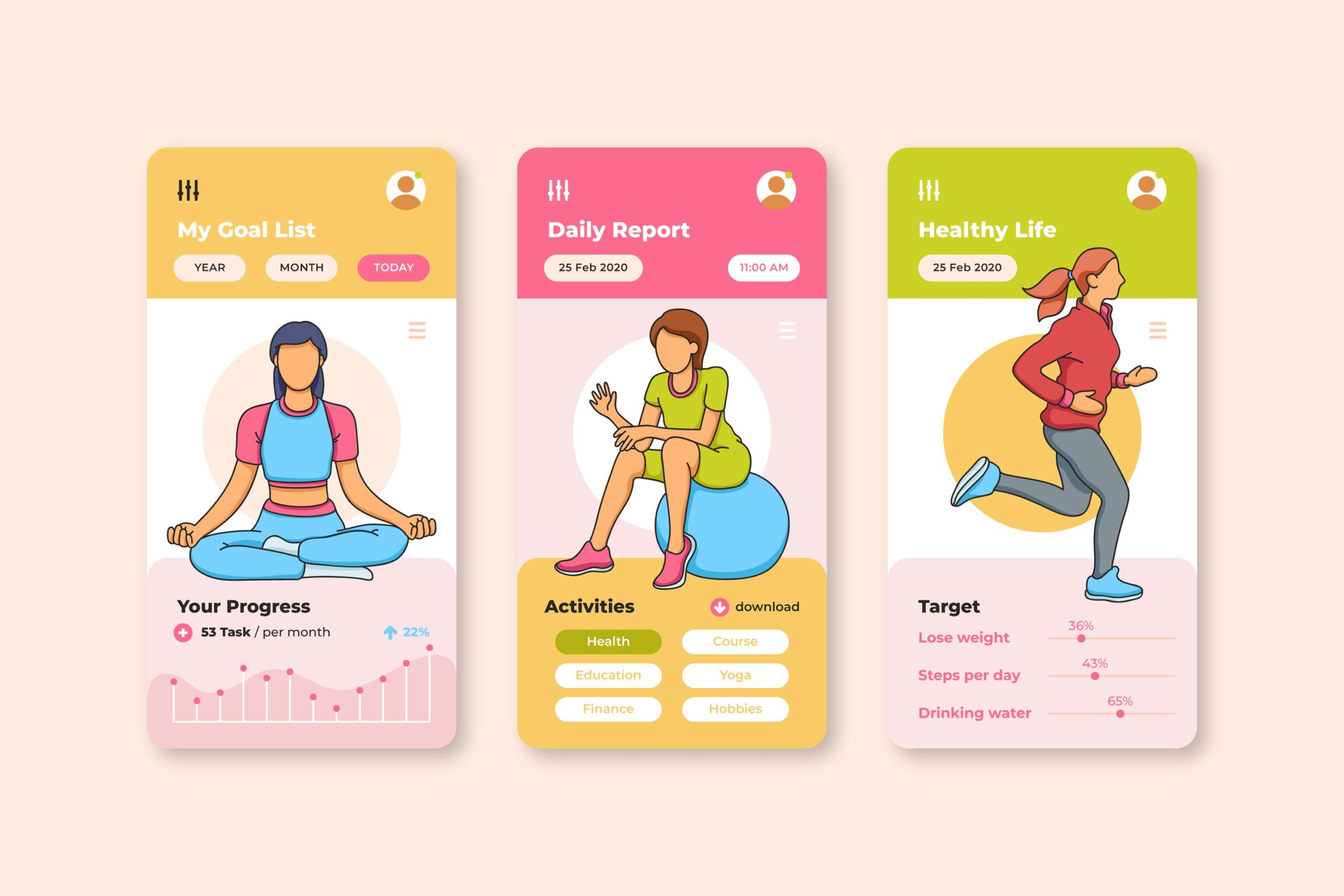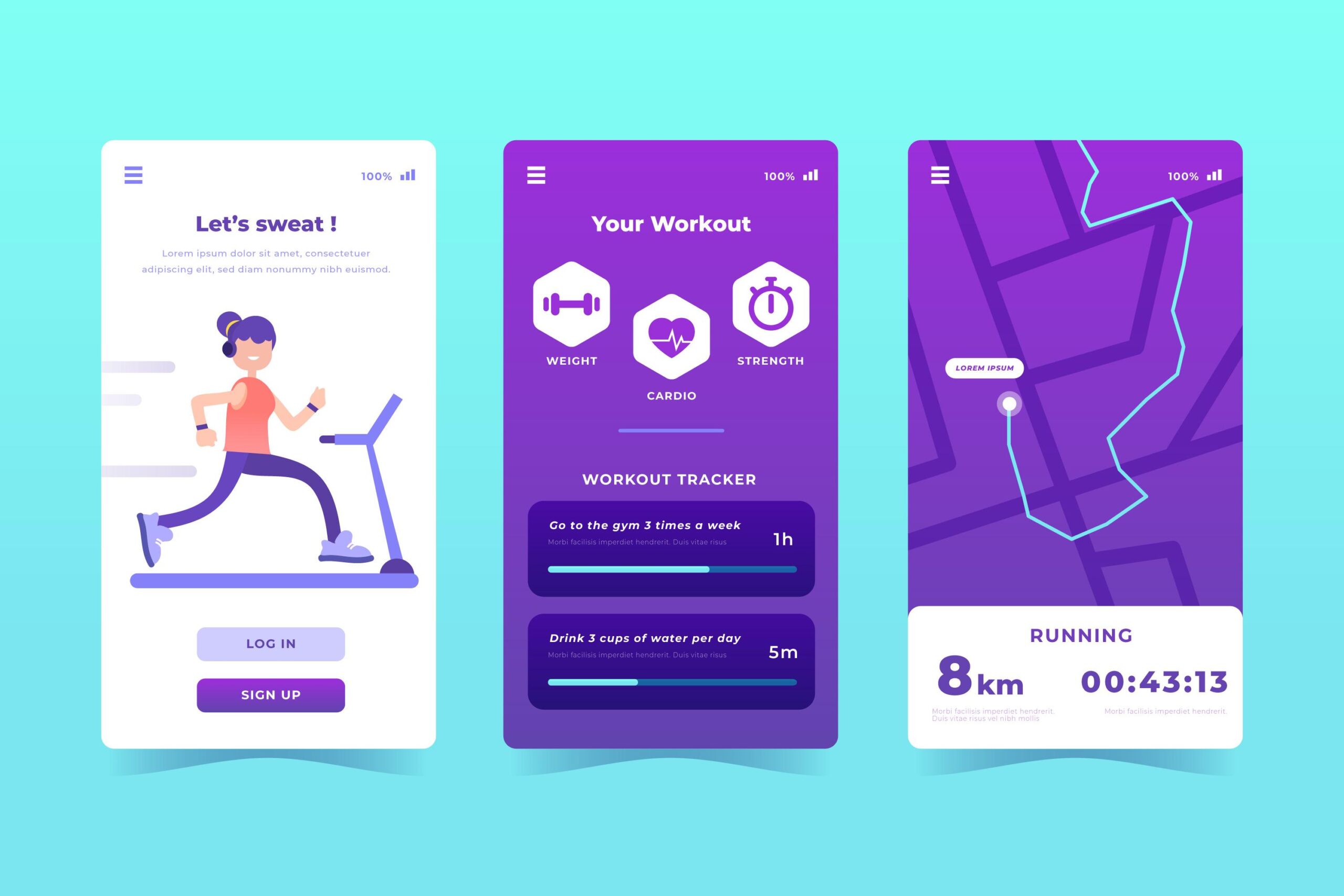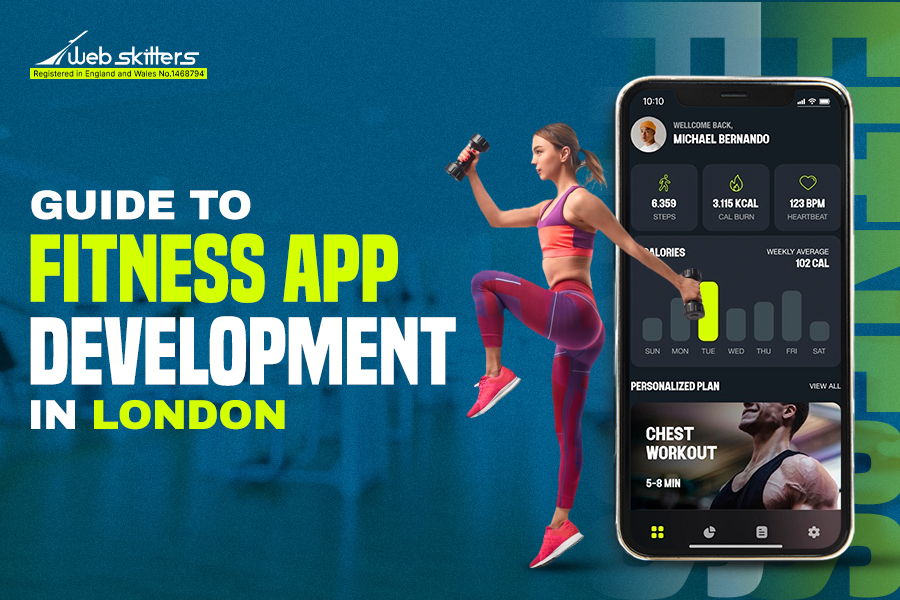- The Fitness Market in the United Kingdom
- Understanding Fitness Apps
- Key Features and Functionalities of Fitness Apps
- For Personal Training Apps –
- For Exercise Tracking Apps –
- For Nutrition and Diet Apps –
- Elements of Fitness App Development
- Fitness App Retention Strategies
- Choosing the Right Development Team
- Importance of Custom Fitness App Solutions
- Fitness App Integration with Wearables and Other Technologies
- Fitness App Launch Strategies
- The Role of App Performance Analytics
- Fitness App Retention Strategies & Marketing
- How Much Does It Cost To Develop A Fitness App?
- Making the Most of a Fitness App Business in London
Eight out of 10 people are inclined to fitness apps for a healthy lifestyle, which is why this domain is so lucrative. So, if you are looking for a digital business idea, a fitness app might be the answer you are looking for.
So, how should you create an online fitness app? Well, we shall explore that today.
Several aspects must be considered when launching a fitness app. It must be developed by professionals, have perfect visual appeal, and be functional.
Additionally, it must cater to the demographic you are planning to target. What are your potential customers looking for? Do they require personal training apps or exercise-tracking technology?
The many factors may seem daunting; however, partnering with the perfect agency helps manifold. This descriptive blog will explore a thorough guide to fitness app development in London. We will also discuss user engagement and customisation opportunities for the ultimate experience.
The Fitness Market in the United Kingdom
How profitable are fitness apps in the UK?
It is vital to understand the market expectations to understand the profitability of such a digital solution.
Demand for nutrition and diet apps has risen significantly. Worldwide revenue is projected to reach 7 billion by the end of 2024.
If we study the United Kingdom alone, the fitness industry is estimated to be around 3 billion GBP by the end of the year. While resourceful gyms are filled with memberships, people seek functional at-home fitness solutions to cater to their health-conscious choices. So, conclusively, the London fitness community is thriving.
The city’s dynamic lifestyle and diverse population have created a solid foundation for fitness entrepreneurs and start-ups. The community comprises gym owners, personal trainers, nutritionists, and fitness enthusiasts. They are instrumentally shaping fitness trends and driving demand for innovative solutions.
Therefore, London has become the epicentre with a promising market for personalised fitness apps, and people demand more.
Launching a London-based health tech requires thoroughly studying the market competition and user expectations. The app must be functional and featured enough to resolve real-life fitness challenges. We shall learn the intricacies in the next section.
Understanding Fitness Apps
The fitness app landscape is diverse, catering to user needs and preferences. The health and wellness apps have become essential for numerous fitness journeys, from tracking workouts to providing personalised diet guidance.
As a business owner planning to launch a fitness app, it is essential to learn about the types of apps available and identify the best for business needs –
Personal Training Apps: These apps offer personalised workout plans tailored to specific fitness goals, such as weight loss or muscle gain. The apps may include video demonstrations, progress tracking, and virtual fitness classes.
Exercise Tracking Apps: Primarily focused on monitoring physical activity, these apps track workouts, steps, calories burned, calories consumed and other metrics. They are integrated with wearable devices for comprehensive healthcare data.
Nutrition and Diet Apps: These apps help users manage their diet by tracking calorie intake, macronutrients, and meal plans. They also provide recipes, food databases, and nutritional information. Users can consult with a certified nutritionist through the app and book appointments.
Meditation and Mindfulness Apps: While not strictly fitness apps, these apps promote mental well-being, which is crucial for overall health. They offer guided meditation, breathing exercises, and relaxation techniques.
Fitness Challenge Apps: The challenge apps promote a sense of camaraderie among fitness enthusiasts. They create healthy competition among like-minded individuals to participate and encourage healthy living.
The most popular types of fitness apps are personalised and offer services based on user complications. For instance, weight and fat loss are different concepts; a functional fitness app must cater to each accordingly.
Key Features and Functionalities of Fitness Apps
When opting for fitness app development in London, knowing what you expect the app to do is vital. It may have all the services mentioned earlier and be an amalgamation of the varied app types, or it can be a specialised app for a targeted segment.
Whichever type of fitness app you choose, ensure it has the following features.
For Personal Training Apps –
- Customised workout plans based on user goals and fitness level
- Video demonstrations of exercises
- Progress tracking and performance analytics
- Integration with wearable devices
- Virtual coaching or community features
For Exercise Tracking Apps –
- Step counter and distance tracking
- Calorie and heart rate monitoring
- Workout tracking (time, intensity, type)
- GPS integration for outdoor activities
- Integration with wearable devices
For Nutrition and Diet Apps –
- Calorie and macronutrient tracking
- Food databases and barcode scanning
- Meal planning and recipe suggestions
- Nutritional information and education
- Progress tracking and goal-setting
By understanding the different types of fitness apps and their core features, you can create a unique fitness application catering to minute preferences. These are only a few of the key features mentioned. We recommend thorough market research before finalising the intricacies.
Additionally, discuss your app needs with the fitness app developers in London. Their market experience allows them to identify opportunities and create innovative and user-centric solutions specific to the market.
Elements of Fitness App Development
There is no denying that the fitness app market is crowded. However, it must not stop you from launching your personalised app. Creating a unique application with a standout user experience (UX) and user interface (UI) is the linchpin of digital success.
Let us discuss the fitness app UI/UX design –
UX design revolves around creating a seamless and intuitive user journey. Similarly, UI design concerns the app’s visual appeal and layout. Together, UI and UX function to create a well-designed fitness application with desirable features and visual appeal.
Users expect apps to be easy to navigate, with clear calls to action and minimal friction. Here are the essentials to consider for a top-notch user experience –
- Intuitive navigation: A clear and logical structure helps users find what they need quickly.
- Visual appeal: A visually appealing design structure enhances user engagement and satisfaction.
- Consistency: Maintaining a consistent look and feel throughout the app creates a cohesive user experience.
- Personalisation: Tailoring the app’s appearance and content to individual preferences can increase user satisfaction.
- Accessibility: Ensuring the app is usable by people with disabilities is essential for inclusivity.
These are the fundamental qualities of a user-focused fitness app. Skipping may lead to website abandonment and an increased bounce rate. We recommend consulting a professional UI/UX web design agency for a top-notch outcome.
Fitness App Retention Strategies
Launching a successful fitness app is brilliant; kudos to you. However, in the long run, the application must keep users engaged. Retention is another vital quality. It ensures the existing users keep coming back for more.
Here are some fitness app retention strategies for takeaway –
- Personalised content: Offer tailored workout plans, nutrition advice, and progress reports based on individual goals and preferences. It can significantly boost user engagement and help your app stand out.
- Gamification: To make the app more fun and motivating, incorporate game-like elements such as challenges, rewards, and leaderboards.
- Social features: Allow users to connect with friends, share achievements, and join groups to foster a sense of community and encourage continued use. Additionally, it can create a broader app reach for elevated traffic.
- Progress tracking: Provide clear and visually appealing progress metrics to help users stay motivated and track their achievements.
- Push notifications: Provide timely and relevant notifications to remind users to stay on track with their fitness goals.
- Community building: Create a supportive community within the fitness app to encourage users to stick with their fitness journey and motivate others to join.
- Data privacy and security: Protect user data to build a trustworthy environment. It ensures user loyalty and contributes to word-of-mouth marketing.
Prioritising UI/UX design is crucial in implementing effective engagement strategies. Ensure that products created by fitness app developers meet user needs and cater to unique challenges in the healthcare realm.

Choosing the Right Development Team
Numerous app development agencies are there in London. Which is ideal to work with?
Well, let us check off the box to find the ideal development partner. There is no right app development agency for developing a functional fitness app. It depends on your business requirements and what you wish to deliver to your potential audience.
Here are the aspects to consider when hiring a fitness app development company in London –
- Define Your Project Scope: Clearly outline your app’s goals, target audience, features, and budget. The clarity helps find a development team that aligns with your vision and delivers a state-of-the-art process.
- Assess the Expertise: Look for a team with a proven track record in fitness app development. Experience in this domain is invaluable. When discussing app needs, ensure they understand the specific challenges and requirements of the industry.
- Evaluate the Portfolio: Review the development team’s previous work. Analyse the quality of apps developed, user interface, and functionality and whether it aligns with the industry standards. It offers a sense of their capabilities and attention to detail.
- Consider the Technical Skills: The team must possess a strong command of relevant technologies, including iOS and Android, wearable integration, cloud platforms, and data analytics. These skills are necessary to develop and deploy a feature application capable of handling multiple fitness facets.
- Evaluate Communication and Collaboration: Effective communication is critical to successful project management. Choose a team that is responsive, transparent, and willing to collaborate closely with you to develop custom fitness app solutions.
- Check the Design Capabilities: A well-designed app is vital for user engagement. Ensure the development team has in-house designers or can collaborate with skilled designers to develop a presence of appeal and intuition.
- Discuss Project Management Methodology: Understand the team’s project management approach. There are quite a few methodologies. However, agile methods often work well for app development because of their flexibility and adaptability.
- Inquire About Post-Launch Support: A reliable development team provides ongoing support, updates, and maintenance for your app. This allows the application to stay relevant and abide by industry standards.
- Get Recommendations: Seek recommendations from other entrepreneurs or businesses in the fitness industry. Their firsthand experiences can be invaluable.
- Consider Cost and Timeline: Discuss the project’s budget and timeline with potential development teams. Ensure their estimates align with your expectations. Also, understand how the development project is charged and always ensure competitive study to identify the best prices.
Remember, building a successful fitness app is a partnership. Choose a development team that shares your passion for health and is committed to delivering an exceptional product. Making the right choice of development partner can lead to the perfect app launch for the saturated market.
Importance of Custom Fitness App Solutions
While off-the-shelf fitness app templates are available, a custom-built solution yields superior results. It is tailored appropriately to align perfectly with your brand identity and target audience. The application features are handpicked to resolve unique problems and overcome challenges. A custom fitness app offers greater flexibility, scalability, and control over functionality, allowing extended room for improvements and revamping.
When customising the fitness app, keep these essentials in check –
- Differentiate your app from competitors
- Incorporate unique features and functionalities
- Ensure a seamless user experience
- Protect your intellectual property
- Build a long-term, scalable platform
Fitness App Integration with Wearables and Other Technologies
The digital market is not new; it emerged long ago and evolved manifold to meet changing user expectations. What we have today is the perfect convergence of technology and wellness.
Understand this as a business owner kickstarting your journey with a fitness app: The market expects advanced gym management software with functional exercise-tracking technology. App integration to wearable technologies is the bare minimum to deliver.
Additionally, the application must create a user-friendly ecosystem to motivate the users to choose a quality lifestyle.
Here is why fitness app integration with wearables is mandatory in the present market –
Enhanced Data Accuracy: Wearable technology provides real-time data on heart rate, calories burned, sleep patterns, and more. Integrating the data with the fitness app offers an accurate and holistic view of user health and fitness levels.
Personalised Experience: Fitness apps can deliver tailored workout plans, nutrition recommendations, and recovery strategies by analysing data from wearables.
Increased User Engagement: Integration with wearables gamifies the fitness experience. The advanced technology motivates users to achieve goals and track progress.
Expanded Functionality: Combining fitness apps with other technologies, such as virtual reality, can create immersive workout experiences and offer new avenues for engagement.
Utilising Other Technologies for an Elevated Fitness App Experience
These are simple yet advanced features to offer the perfect experience with a fitness app, once integrated with a wearable –
- Heart Rate Monitoring: Integrating heart rate data helps users optimise workout intensity and monitor overall cardiovascular health.
- Sleep Tracking: Analysing sleep patterns provides insights into recovery and helps users optimise their training schedules.
- GPS Integration: For outdoor activities, GPS integration enables accurate tracking of distance, pace, and elevation.
- Virtual Fitness Classes: Combining fitness apps with virtual or augmented reality creates an immersive and interactive workout experience.
- Gym Management Software Integration: For gym owners, integrating fitness apps with gym management software can streamline operations, track member progress, and offer personalised recommendations.
Fitness apps are indispensable tools with the right features. They can help users achieve their health and fitness goals. Therefore, when planning on developing the app, ensure it is built by professionals, feature-rich, and impactful for traction-able outcomes.

Fitness App Launch Strategies
Launching a fitness app is just the beginning. Several other measures ensure the app reaches the ideal audience and achieves traffic. A successful launch requires meticulous planning and execution.
Here are some effective launch strategies for quality footfall and revenue –
- Pre-Launch Marketing: Generate buzz and anticipation through social media campaigns, influencer partnerships, and email marketing. Although marketing can sometimes sound unnerving, it is the core element of digital success. Start by offering exclusive pre-launch deals or early access to build excitement amidst the potential traffic.
- App Store Optimisation (ASO): Whether you build an iOS or Android app, the application must be effectively prepped for the store launch. Optimise the app title, incorporate keywords in the descriptions, and structure the visuals to improve visibility in app stores. Conduct thorough keyword research to target relevant search terms.
- Public Relations: Contact fitness and tech media outlets to generate press coverage. Highlight your app’s unique features and benefits and offer the audience the unique USP they need to convert.
- Soft Launch: Consider launching in a specific region or to a limited audience to gather feedback and make necessary adjustments before a full-scale launch.
Remember, launching the application in the store and convincing users to hit download are different things. The latter demands effective strategies and skilled marketing experts.
The Role of App Performance Analytics
Understanding whether or not your fitness app is working in the market is not rocket science. All you must do is analyse app performance through data evaluation. Tracking is crucial, and it ensures impactful decision-making.
App analytics provide valuable insights into user behaviour, engagement, and retention. Here are the key metrics to monitor to analyse the success meter of the application –
- User Acquisition: Track the number of app downloads and installs across different channels.
- User Engagement: Measure how often the users are opening the app, the time spent within it, and the features they use most frequently.
- Retention: Analyse user retention rates to understand how well it keeps users engaged over time and what requires rework.
- Monetisation: Track revenue generated through in-app purchases, subscriptions, or advertising.
- User Feedback: Monitor app store reviews and user feedback to identify areas for improvement. You can also perform real-time interactions to understand user expectations and what new can be introduced.
Analysing the app performance metrics closely allows you to identify trends and optimise the application for advanced features and functionality. Tailor the marketing efforts accordingly to ensure like-minded people are introduced to your unique presence.
Remember, app development is an ongoing process. Continuous performance improvement based on data is essential for long-term success.
Fitness App Retention Strategies & Marketing
Effective marketing strategies are mandatory to reach the target audience for fitness apps. Similarly, retention strategies allow you to maintain user engagement in fitness apps.
This section will share expert-curated strategies to ensure the fitness app successfully navigates the digital realm.
Marketing Strategies –
- Invest enough time to identify your target audience. Segregate the potential traffic based on demographics, interests, and fitness goals. It helps tailor the marketing efforts for lucrative results.
- Utilise social media platforms like Instagram, TikTok, and Facebook to create engaging content showcasing app benefits and features. Collaborate with fitness influencers to expand their reach.
- Develop high-quality blog posts, articles, and videos to provide valuable fitness information and elevate authoritativeness in the industry.
- Optimise the listing with relevant keywords, compelling descriptions, and visually appealing screenshots to enhance visibility.
- Create an email list and send targeted campaigns with exclusive offers, workout tips, and updates. Personalised Personalised has the highest engagement rate and works wonders.
Retention Strategies –
While marketing ensures your app reaches the right audience, retention resolves the issue of customers never returning. Here are some retention best practices to utilise –
- Utilise data to create personalised nutrition recommendations and progress tracking.
- Develop a sense of community through in-app social features, challenges, and support groups.
- Incorporate game-like elements such as rewards, badges, and leaderboards to motivate users.
- Send timely and relevant notifications to remind users about workouts, goals, and achievements.
- Regularly update your app with new features, content, and challenges to keep users interested.
- Provide excellent customer support to address user concerns and build loyalty. Keep customer interactions prompt and simplified for elevated retention.
You can build a thriving fitness app for long-term success by combining effective marketing and result-driven retention strategies.
How Much Does It Cost To Develop A Fitness App?
Developing a fitness app in London can be a significant investment. The affordability varies, depending on app complexity, features, design, and other development charges.
Here is a basic breakdown –
Development Costs include hiring developers, designers, and project managers. London is a tech hub, and several app development agencies with supreme tech expertise are available.
Design Costs: A visually appealing and user-friendly interface is crucial. Design costs cover UI/UX design, graphic design, and prototyping.
Technology Costs: Depending on the app’s features, you might incur costs for cloud services, API integrations, and other software. A platform fee is an additional charge every business must pay.
Marketing and Launch Costs: Budget for app store optimisation, optimisation, public relations, and launch events.
Conduct thorough market research and create a detailed project plan to estimate the overall development cost accurately. Additionally, talk to several agencies to compare prices and find an affordable option.
The initial investment can be substantial. However, a successful fitness app generates significant revenue through subscriptions, in-app purchases, or partnerships with fitness brands. Businesses can experience an increased ROI through a structured fitness app.

Fitness Mobile App Development Trends in 2024
If you are launching your fitness app soon, it is vital to be aware of the various mobile app development trends in the UK.
London is at the forefront of fitness app innovation. The confluence of health-conscious consumers, London’s tech-startup ecosystem, and a growing emphasis on wellness has fuelled a dynamic market.
Here is a list of Current fitness app development trends in the UK –
- Hyper-personalisation is Utilising learning to deliver highly tailored workout plans, nutrition advice, and mental health support based on individual needs and preferences.
- Mental Health Integration: Apps incorporate mindfulness, meditation, and stress management features to recognise the connectedness of physical and mental health.
- Virtual and Augmented Reality: Immersive workout experiences and virtual fitness classes are gaining traction. These offer users engaging and interactive ways to exercise.
- Wearable Integration: Seamless integration with wearable devices is becoming standard, providing comprehensive data and insights for users.
- Subscription Models: Many fitness apps are adopting subscription-based models to generate recurring revenue and offer premium features.
- Gamification: Incorporating game elements to make workouts fun and engaging, encouraging user retention and motivation.
As technology advances, we can expect more innovative and effective fitness solutions to emerge from the UK market.
Making the Most of a Fitness App Business in London
We have come to the end of this informative read and discussed all the instances of fitness app development in London.
Whether fitness or not, whichever business domain you opt for, embracing promotion through mobile technology is becoming mandatory. More and more users are inclined towards mobile applications over web versions for convenience and ease of usage.
As a business, it is crucial to partner with the ideal mobile app development company to deliver user-friendly applications. It ensures optimum business growth and a positive experience.
At Webskitters Ltd., we are prepped to launch your fitness app ideas into the market with a team of development and marketing experts. Our proven track record in app development allows us to create authentic and advanced mobile apps for varied business niches.
Consult to discuss your fitness app ideas today!

